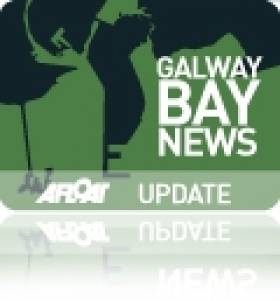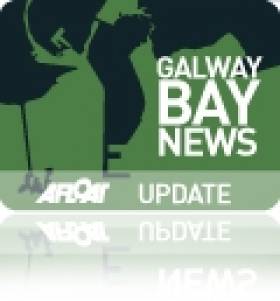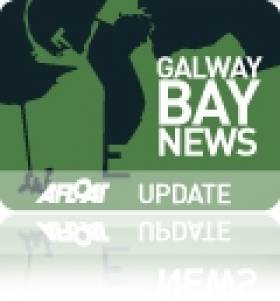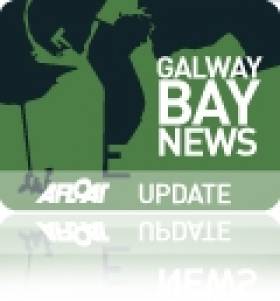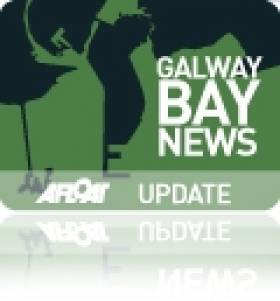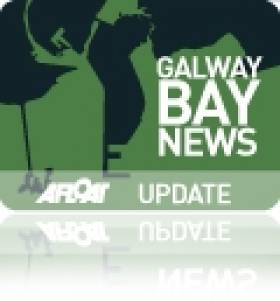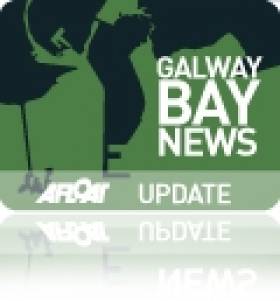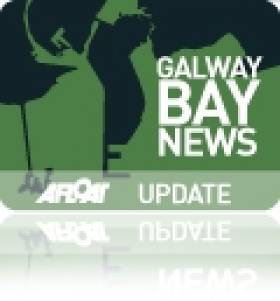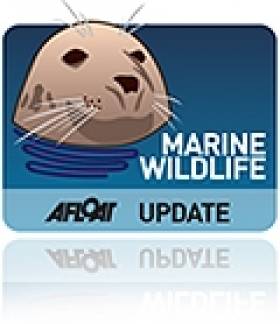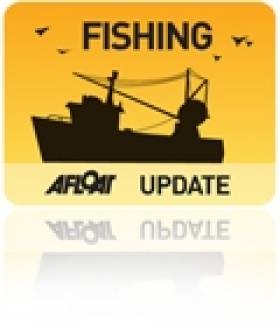Displaying items by tag: aquaculture
BIM Pulls Out Of Galway Bay Fish Farm Meeting
#FishFarm - Galway Bay FM reports that Bord Iascaigh Mhara (BIM) has pulled out of a public meeting on the proposed Galway Bay deep sea fish farm scheduled for this evening (25 April).
The Sinn Féin-organised meeting at the Westwood Hotel in the city tonight was intended to be a debate hearing arguments from both sides regarding the controversial aquaculture project, according to the Galway Advertiser.
However, a statement issued by BIM - which is proposing the salmon farm scheme - claims that "recent statements from some angling groups" have made it impossible to provide a public platform for its side of the issue.
If the project goes ahead, the 500-hectare facility would be the largest of its kind in Europe. But it has faced strong opposition from local anglers and the State fisheries body Inland Fisheries Ireland over the risk posed by sea lice.
As previously reported on Afloat.ie, the proposed fish farm off the Aran Islands has even put local TDs at odds over questions of the potential benefits and hazards.
Meanwhile, the Galway Advertiser says that opposition group Galway Bay Against Salmon Cages plans to lodge their protest at the constituency office of Taoiseach Enda Kenny in Castlebar this Saturday 27 April as part of a nationwide campaign.
Groups Appeal For Clarity Over Galway Bay Fish Farm Plans
#FishFarm - Groups opposed to the controversial deep-sea fish farm in Galway Bay have written to TDs asking them to bring clarity to the growing conflict over the proposals.
As the Southern Star reports, the groups have asked for a review of the current licensing requirements for aquaculture schemes to ensure that the process is transparent and open to independent review - amid news that both local TDs and State agencies are squabbling over the issue.
"To have a single minister responsible for all these stages of an industry that has such serious pollution issues associated with it, as well as the potential to devastate valuable salmon and sea trout stocks, is inappropriate and open to abuse," argues Alec O'Donovan of Save Bantry Bay, one of the groups in an alliance that include local tourism, angling and environmental interests.
Group chairman Kieran O'Shea singled out for criticism the Department of the Marine's apparent determination to push forward with Bord Iascaigh Mhara's (BIM) fish farm plans in spite of a moratorium on further development of salmon farming three years ago at EU level.
"This not only makes a mockery of EU law but highlights a worrying lack of concern for the environment," said O'Shea.
Meanwhile, another opposition group has spoken out over a letter of support for the fish farm plans by Irish seafood producers and other businesses.
According to the Galway Independent, Brian Curran Galway Bay Against Salmon Cages (GBASC) claimed the letter - signed by 43 firms, only six of which are directly involved in food production in Galway - was a "set-up".
A spokesperson for BIM dismissed Curran's comments as being "in very poor taste" in seeking "to undermine the intentions or credibility of anyone who would go out of their way to place their support for the proposal 'on the record'."
As previously reported on Afloat.ie, the 500-hectare development off Inis Óirr in the Aran Islands would be the largest of its kind in Europe.
Squabbling State Agencies Skip Fish Farm Debate
#FishFarm - The expected debate between two State agencies at loggerheads over the proposed Galway Bay deep-sea fish farm failed to take place as planned over the weekend as neither body sent a representative.
Bord Iascaigh Mhara (BIM) and Inland Fisheries Ireland (IFI) had been expected to debate the planned 500-hectare organic salmon farm off the Aran Islands during the Galway Food Festival over the Easter weekend.
Organisers were informed at the last minute that neither agency would be involved in the public event, with BIM telling The Irish Times it did not feel it would be appropriate to discuss the matter in an open forum when negotiations were ongoing.
Both sides have differed over the potential impact on wild salmon populations in the area, with IFI citing research that damns the negative consequences of sea lice infestations in fish farms.
Despite their absence, the debate went ahead as scheduled, with local businesses on both sides of the argument expressing their views.
The Irish Times has more on the story HERE.
Councillor's Concern Over Galway Bay Fish Farm
#FishFarm - A Galway county councillor has declared his reservations over the proposed deep-water organic salmon farm off the Aran Islands, as Galway Bay FM reports.
Cllr Jim Cuddy said at this week's meeting of Galway County Council that concerns had been expressed to him by angling interests over plans for the 500-hectare aquaculture scheme in Galway Bay and its potential effects on wild salmon stocks.
His motion, which was seconded by Cllr Thomás O'Curraoin, comes in the same week as 13 seafood companies based in the City of the Tribes showed their support for the fish farm plans in letters of support to Bord Iascaigh Mhara (BIM).
As reported earlier this week on Afloat.ie, two West Galway TDs were at loggerheads over the proposals, the planning application for which is still under consideration.
TDs At Odds Over Galway Bay Fish Farm Plans
#FishFarm - Galway Bay FM reports that two West Galway TDs are at loggerheads over the proposed deep-water organic salmon farm for Galway Bay.
Eámon Ó Cuív of Fianna Fáil says Marine Minister Simon Coveney is showing inappropriate support for the aquaculture scheme proposed by Bord Iascaigh Mhara.
In response, Fine Gael deputy Seán Kyne reiterated the minister's own Dáil statement earlier this month that procedure would be followed 'to the letter' and that he could not take sides on the matter.
According to Galway Bay FM, the application for the 500-hectare fish farm, to be located off the Aran Islands, is still under consideration.
If greenlit, the facility would be the largest of its kind in Europe and would double the State's production rate of very profitable organic salmon.
But the plans have faced opposition from Inland Fisheries Ireland and local anglers, many of whom joined a 2,000-strong protest against the project in Galway city centre on 2 March.
#FishFarm - The Government 'will follow procedure to the letter' regarding the proposed €100-million deep sea fish farm for Galway Bay.
That was the message from Marine Minister Simon Coveney in the Dáil last week, as reported by Galway Bay FM, after it emerged that more than 400 submissions on plans for the State's largest ever aquaculture scheme were made to the his department.
The Dáil discussions came just days after a public protest against the fish farm plans in Galway - and some months after the National Inland Fisheries Forum lambasted as "flawed" the consent process regarding the proposed development.
Some 2,000 people amassed in opposition to the 500-hectare organic salmon farm off the Aran Islands proposed by Bord Iascaigh Mhara (BIM), which if it gets the go-ahead would be the largest facility of its type in Europe and would double the State's production rate of organic salmon - one of Ireland's most profitable export foodstuffs.
BIM has previously accused environmental campaigners of being "deliberately alarmist" about the fish farm, despite concerns raised my Inland Fisheries Ireland over the potential impact of sea lice infestations on wild salmon in the bay.
Meanwhile, in a letter to the Galway Advertiser last week, Attymon resident Gabe Cronolly criticises a BIM leaflet informing the public of its proposals.
"The leaflet states that sea lice can only be held responsible for one per cent of salmon losses at sea, but fail to report that 39 per cent of mortalities in fish farms are attributed to sea lice," he writes.
Thousands Attend Fish Farm Protest in Galway
#FishFarm - As many as 2,000 people attended the protest in Galway against the proposed deep sea fish farm off the Aran Islands at the weekend.
As previously reported on Afloat.ie, the demonstration was organised by Galway Bay Against Salmon Cages on Saturday 2 March in opposition to the 500-hectare organic salmon farm proposed by Bord Iascaigh Mhara (BIM).
Among the speakers on the day, as The Irish Times reports, was Icelandic salmon conservationist Orri Vigfusson, who claimed the fish farm could interfere with the migration of salmon smolts from both Ireland and the rest of Europe.
GBASC vice-chairman Tommy Casserly also spoke, referring to the fish farm project as "a toxic cloud containing seven million caged salmon with all those faeces and chemicals and lice, between the Atlantic and 15,000 wild salmon which come through these waters".
Later in the day a delegation attempted to hand a letter of protest to BIM staff attending the Skipper Expo in the city, but said it was refused.
If the Galway Bay fish farm project gets the go-ahead, it would be the largest aquaculture facility of its type in Europe and would double the State's production rate of organic salmon.
The Irish Times has more on the story HERE.
Protest in Galway Over Fish Farm Plans This Weekend
#Fishfarm - Galway Bay FM reports that a major protest is set to take place in Galway this weekend against the proposed deep sea fish farm off the Aran Islands.
Galway Bay Against Salmon Cages is organising the demonstration from Eyre Square on Saturday 2 March at noon in opposition to the 500-hectare organic salmon farm proposed by Bord Iascaigh Mhara (BIM).
The facility, to be located off Inis Oírr in Galway Bay, would be the largest of its kind in Europe and would double the State's production rate of organic salmon, cited by BIM as Ireland's leading organic food export.
However, the scheme has been facing strong opposition from fisheries groups and local anglers citing the potential environmental impact on wild salmon numbers and the threat to tourism in the area.
Inland Fisheries Ireland is among those bodies that have expressed concern over the fish farm plans, citing research on the effect of sea lice emanating from aquaculture facilities on the mortality rate of wild Atlantic salmon.
BIM responded to news of the protest by stating such action may be unnecessary due to the appeal mechanism available in the State's decision process.
West Cork Weekends Will Bring You Closer To Marine Wildlife
#MarineWildlife - If you've ever wanted to get closer to Ireland's marine wildlife, a new series of weekend excursions in West Cork may be just the ticket.
The Southern Star reports on the 'Discover Wildlife Weekends' being run from Rosscarbery by local company Ireland's Wildlife starting this April, where those taking part will be led by expert guides to explore the coastal region and have the best opportunities to spot the many species of whales and dolphins that visit our shores.
Weather permitting, the weekends will also involve some offshore whale watching in the company of 'whale watch supremo' Colin Barnes and the Irish Whale and Dolphin Group's (IWDG) sightings co-ordinator Pádraig Whooley.
And birdwatching will also be a feature, as West Cork is a hotspot for our feathered friends - from merlins and peregrine falcons to coastal waders and more exotic fowl that skirt our coasts on their spring migrations.
The Southern Star has much more on the story HERE.
Meanwhile, marine sector stakeholders have expressed their concerns over the designation of six new offshore marine areas by the National Parks and Wildlife Service.
As previously reported on Afloat.ie, the six sites at Blackwater Bank in Wexford, the West Connacht coast, Hempton's Turbot Bank in Donegal, the Porcupine Bank Canyon off Kerry, the South-East Rockall Bank, and the stretch from Rockabill to Dalkey Island off Dublin have been proposed for designation as Special Areas of Conservation (SACs) to protect marine habitats and species listed on the 1992 EU Habitats Directive.
But at a recent meeting at the Irish Farm Centre in Dublin, a coalition of fish farmers, fishermen and marine energy stakeholders have hit out at what they characterise as "the appalling handling of inshore designations since the 1990s by the State", which they claim "has resulted in hundreds of job losses and a flight of serious investment" from Ireland's coastal areas.
“Our experience of the Irish Government’s application of the EU Habitats Directive has been a saga of mismanagement, foot dragging and buck-passing which has left over 500 fish farming licences in limbo for over 10 years and a backlog of red tape and bureaucracy which could see producers waiting until 2020 and beyond for simple renewals which are vital to underpin their businesses," said IFA aquaculture executive Richie Flynn.
"These new offshore SACs will have the same effect of preventing any fishing, marine energy or aquaculture being carried out in these areas if left in the hands of the same agencies to manage."
IFI Welcomes New Research On Sea Lice and Wild Salmon
#FishFarm - Inland Fisheries Ireland has welcomed "a clear acceptance of the impact of sea lice on juvenile salmon" following a recent Marine Institute publication that identifies the effect of sea lice emanating from aquaculture facilities on wild Atlantic salmon mortality.
According to IFI, the paper published in the Journal of Fish Diseases "concurs with previously published international research" that it says establishes an incontrovertible link between fish farm developments and negative effects on local wild salmon numbers, as previously reported on Afloat.ie.
It adds that "the debate can now progress to identify the best methodologies to reduce or eliminate this impact" as well as moves on "the issue of escaped farmed salmon".
In a statement on the new paper, IFI says the research "identified that just under 40% of released juvenile salmon showed a significant difference in return rate between sea lice ‘treated’ and ‘non-treated’ groups, indicating that mortality from sea lice is significant in 40% of the releases in the study. Unfortunately, there was a significant effect from sea lice in six different bays along the west coast over the study period.
"This recent study provides further evidence that salmon will be impacted by sea lice. The location of salmon farms in relation to salmon rivers and the control of sea lice prior to and during juveniles salmon migration to their high seas feeding ground is critical if wild salmon stocks are not to be impacted.
"The development of resistance to chemical treatment of sea lice and other fish husbandry problems, such as pancreas disease and amoebic gill disease, are likely to make effective sea lice control even more difficult in future years."
IFI also highlights the Norwegian government's concerns about the impact of sea lice and escaped farm salmon on wild salmon stocks.
The statutory body for the protection and conservation for Ireland's inland fisheries reiterated its support for "the development of a sustainable aquaculture industry" to "safeguard wild salmon and sea trout stocks into the future".
It adds that recommendations on the above issues have been made in its submission to the Department of the Marine on the Environmental Impact Statement regarding the proposed deep-sea organic salmon farm in Galway Bay, a scheme that has been the subject of controversy over recent months.



























